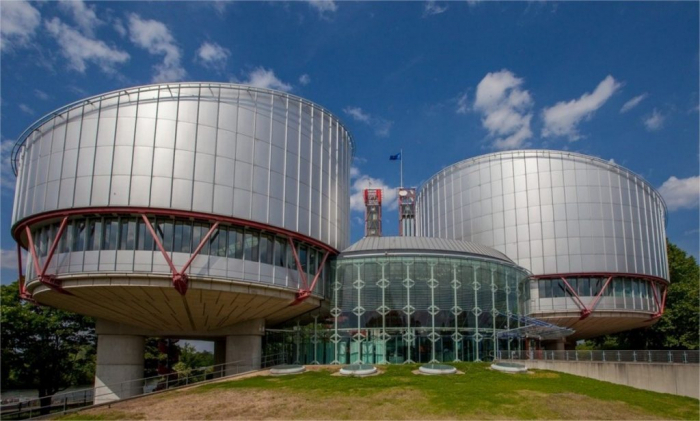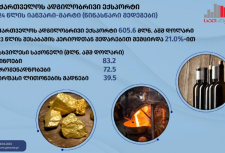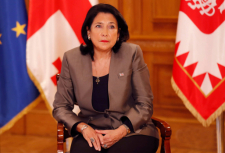Strasbourg court ruled on Saakashvili's claim

The European Court of Human Rights (ECHR) has sent to the parties its decision entitled "Saakashvili v. Georgia" regarding the request for the application of a temporary interim measure.
Former Georgian President Mikheil Saakashvili, who has been in custody since October 1 and has not stopped his hunger strike since then, was represented at the ECHR by lawyers: Tamta Muradashvili, Dimitri Sadzaglishvili and Beka Basilaya.
"The court, to respect the interests of the parties and the proper conduct of the case, decided to call on the applicant (Mikhail Saakashvili) to stop the hunger strike.
The Court also decided that the Government should inform him (the court) about the current state of health of the applicant (Mikheil Saakashvili) (as well as about the medical treatment carried out in the prison hospital) and (the Government) should ensure his safety while in prison and appropriate medical treatment/service during the period after the end of the hunger strike.
The attention of the parties is drawn to the fact that the non-compliance by the signatory country with the measures provided for in Article 39 may cause a violation of article 34 of the European Convention on Human Rights (this article obliges not to hinder the filing of a complaint to the ECHR).
In this regard, the letter mentions the decision adopted by the Grand Chamber of the ECHR in the case of Mamatkulov and Askarov dated February 4, 2005, paragraphs 128 and 129, as well as the fifth paragraph of the resolution on the same case.
"The court also decided, in accordance with Article 41, to assign priority to applications," the letter sent by the ECHR to the parties says.
The Court also requests information from both parties on the steps taken to comply with the measures provided for in Article 39 of the European Convention.
The deadline for providing information to the parties is set until November 24, 2021.
How the ECHR's decision is explained by human rights activists
Tamta Mikeladze, head of the EMC human rights organization, posted a post on Facebook in which she rightly noted that in Georgia "polarization manifested itself even in the process of reading the decision of the European Court."
Explaining the decision of the ECHR, Mikeladze stressed that now the case of the ex-president will be under the supervision of the Strasbourg Court, but at this stage everything will be limited to the request and verification of information.
"In fact, the European Court in the Saakashvili case did use a temporary measure and included this special procedure designed to prevent irreversible violations of human rights, the convention and the rules of court.
As part of the temporary measure mechanism, the European Court demanded that the Georgian government report on the prisoner's health status, and Saakashvili called for an end to the hunger strike.
The European Court assigned priority to this case.
This is a standard condition for the use of temporary measures during a claim related to the conditions of imprisonment.
When the court begins to study the issue from obtaining information, this stage is already a form of supervision.
This means that the ongoing processes of imprisonment and the treatment of the prisoner (including the provision of medical care) are under the supervision of the European Court.
If there is a reason for this, the court may require the government to perform tasks of a new type, including providing appropriate medical treatment, and even transfer to another clinic.
However, this will be verified based on documents and evidence. So far, the court has not done this, and at the first stage of the review was limited to requesting information and documents and checking them.
In any case, the supervision of the European Court over this process is important for the rights and security of Saakashvili and for curbing political speculation on this topic," Mikeladze writes.
newsgeorgia.ge
Tags:
Strasbourg court ruled on Saakashvili's claim

The European Court of Human Rights (ECHR) has sent to the parties its decision entitled "Saakashvili v. Georgia" regarding the request for the application of a temporary interim measure.
Former Georgian President Mikheil Saakashvili, who has been in custody since October 1 and has not stopped his hunger strike since then, was represented at the ECHR by lawyers: Tamta Muradashvili, Dimitri Sadzaglishvili and Beka Basilaya.
"The court, to respect the interests of the parties and the proper conduct of the case, decided to call on the applicant (Mikhail Saakashvili) to stop the hunger strike.
The Court also decided that the Government should inform him (the court) about the current state of health of the applicant (Mikheil Saakashvili) (as well as about the medical treatment carried out in the prison hospital) and (the Government) should ensure his safety while in prison and appropriate medical treatment/service during the period after the end of the hunger strike.
The attention of the parties is drawn to the fact that the non-compliance by the signatory country with the measures provided for in Article 39 may cause a violation of article 34 of the European Convention on Human Rights (this article obliges not to hinder the filing of a complaint to the ECHR).
In this regard, the letter mentions the decision adopted by the Grand Chamber of the ECHR in the case of Mamatkulov and Askarov dated February 4, 2005, paragraphs 128 and 129, as well as the fifth paragraph of the resolution on the same case.
"The court also decided, in accordance with Article 41, to assign priority to applications," the letter sent by the ECHR to the parties says.
The Court also requests information from both parties on the steps taken to comply with the measures provided for in Article 39 of the European Convention.
The deadline for providing information to the parties is set until November 24, 2021.
How the ECHR's decision is explained by human rights activists
Tamta Mikeladze, head of the EMC human rights organization, posted a post on Facebook in which she rightly noted that in Georgia "polarization manifested itself even in the process of reading the decision of the European Court."
Explaining the decision of the ECHR, Mikeladze stressed that now the case of the ex-president will be under the supervision of the Strasbourg Court, but at this stage everything will be limited to the request and verification of information.
"In fact, the European Court in the Saakashvili case did use a temporary measure and included this special procedure designed to prevent irreversible violations of human rights, the convention and the rules of court.
As part of the temporary measure mechanism, the European Court demanded that the Georgian government report on the prisoner's health status, and Saakashvili called for an end to the hunger strike.
The European Court assigned priority to this case.
This is a standard condition for the use of temporary measures during a claim related to the conditions of imprisonment.
When the court begins to study the issue from obtaining information, this stage is already a form of supervision.
This means that the ongoing processes of imprisonment and the treatment of the prisoner (including the provision of medical care) are under the supervision of the European Court.
If there is a reason for this, the court may require the government to perform tasks of a new type, including providing appropriate medical treatment, and even transfer to another clinic.
However, this will be verified based on documents and evidence. So far, the court has not done this, and at the first stage of the review was limited to requesting information and documents and checking them.
In any case, the supervision of the European Court over this process is important for the rights and security of Saakashvili and for curbing political speculation on this topic," Mikeladze writes.
newsgeorgia.ge
Tags:

























